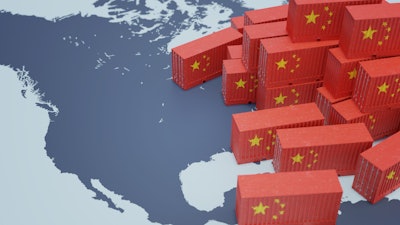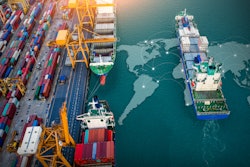
The following is an editorial submitted by long-time contributor Mike Collins. Many of the statements in this column are based on his perceptions and opinions.
The high priests of globalization and free trade claimed it would benefit everyone by raising output and productivity, creating more jobs, raising wages, and lowering prices of products in the world economy. America became the freest of all free trade countries and opened our markets to our trading partners.
Clyde Prestowitz says, “None of the relatively wealthy countries got rich from the practice of free trade. They all got rich by practicing mercantilism.” We stood by and watched as they used mercantilist strategies and we did nothing to stop them.
Nearly a century of free trade and globalization has led to the deindustrialization of America and the decline of much of the middle class. As jobs were outsourced to low wage countries, wages in America were reduced and wages in the low wage countries increased, which is called regression to the mean. lt is now pretty obvious for America that globalization had a serious downside with many workers and communities being left behind.
U.S. Trade Representative Katherine Tai, at an event at the National Press Club June 20, 2023, said, “Globalization in its current form is no longer sustainable.” She goes on to say, ”The system itself, then, created an incentive for countries to compete by maintaining lower standards, or by lowering their standards even further, as companies sought to minimize costs in pursuit of maximizing efficiency.
"This is the race to the bottom, where exploitation is rewarded and high standards are abandoned in order to compete and survive. When efficiency and low cost are the only motivators, production moves outside our borders. It becomes increasingly consolidated in one economy—such as China — which manipulates cost structures, controls key industries, and became a dominant supplier for many important goods and technologies.”
Read: The Pros And Cons Of Globalization
Globalization Run AMOK
In order to participate in the globalism game, America accepted huge trade deficits with our trading partners, which exceeded $1.1 trillion in 2022. In essence we are betting the farm to get cheap imports. According to the Economic Policy Institute, trade deficits have eliminated nearly five million good-paying manufacturing jobs and 90,000 factories. Some additional factors to consider:
- Rogue nations. America is waking up to the fact that the U.S. is at the mercy of rogue nations like China that are committed to taking our markets and technologies by any means. People are beginning to realize that having a free trade agreement with China is a game we cannot win
- Loss of Income. A paper on The Persistence of the China Shock, by David Autor and David Dorn, says that of 722 U.S. regions analyzed, 223 of them, or 32.8 percent, suffered absolute declines in real per capita income. This means that “the open door for Chinese imports reduced the incomes of one third of the U.S. public”.
- Deindustrialization. There are many losers in globalism. Workers, communities and even regions have been devastated by outsourcing and globalism. Laid-off manufacturing workers have been forced to take low pay service jobs and are worried and angry about their futures.
- Political Changes. The victims of globalization have become a political problem for Western Nations. There is a rebellion by those people left behind that has led to the rise of nationalism and populism, increased anti-immigration sentiment, and pressure on governments for more protection
A government report by the International Trade Commission (ITC) in June of 2021 analyzed the results of 16 Free Trade Agreements (FTAs) from 1985 to 2020. Free trade agreements were the drivers of globalization and a careful analysis of the report shows little benefit and a lot of problems. FTAs were good for white collar but very bad for blue collar workers, particularly workers without a college education, women, and people of color.
It was good for big corporations like General Motors but not small or midsize supplier firms. FTAs were very good for imports but not exports. GDP rose only 0.5 percent between 1985 and 2017 and real income rose only 0.6 percent. The overall takeaway is that globalization and free trade produced very little growth or job creation and most of the economic benefits went to the multinationals and their investors
Reconsidering Globalization
In April 2023, National Security Advisor Jake Sullivan spoke publicly about a new American economic doctrine that will turn back the free trade doctrines of the past and suggests limits to globalism. He did so for reasons of national security because of mercantilist economic and trade policies being pursued by China, and because of U.S. trade deficits currently running at about 3.5 percent of GDP. Sullivan says ”This strategy will build a fairer, more durable global economic order, for the benefit of ourselves and for people everywhere”.
Today, many people are reconsidering the decades-long policy of outsourcing to low price countries and the loss of technologies and industries. Larry Fink, of Black Rock Financial, said in his 2022 letter to shareholders that "supply chain disruption caused by the pandemic and Russian invasions of Ukraine has put an end to globalization we have experienced over the last three decades.”
Another finance guy, Howard Marks, co-chairman of Oaktree Capital Management, said," the negative aspects of globalization have now caused the pendulum to swing back towards local sourcing.” Outsourcing, he says, "led to the elimination of millions of jobs and the hollowing out of manufacturing regions and the middle class of our country.”
In her new book, Homecoming: The Path to Prosperity in a Post-Global World, Rana Foroohar, a New York, financial analyst, makes the case that global corporations have controlled more businesses, more wealth and political power than any time in history, “which has led us to a place in which neoliberal visions of globalization are collapsing. Individuals everywhere are left stranded in the middle.” Alternatives to laissez-faire globalism are gaining influential followers.
There are strong indications that the era of globalization is changing. Corporations are now scrambling for trading partners closer to home. The war in Ukraine and the threat of China have forced many U.S. manufacturers to reevaluate their sourcing locations and have begun reshoring production and jobs. According to the Reshoring Initiative 1,675,000 jobs have been reshored since 2010. Nobody can project what globalism will look like in the future but it is a safe bet that globalization as we have understood it is ending.






















